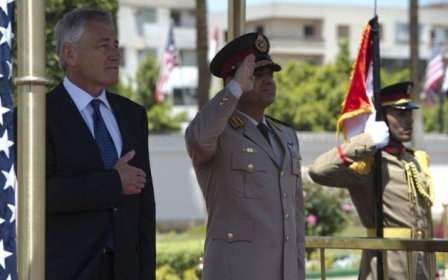'No political detainees' in Egypt says Justice Minister

Egypt’s Justice Minister insisted on Saturday that there are no political prisoners in the country, as 19 supporters of ousted president Mohamed Morsi were sentenced to five years in prison for occupying the offices of Cairo’s al-Azhar University.
“There are no political detainees in Egypt,” Nair Osman told a press conference in Cairo, adding, “all those detained are being held pending investigation”.
Since the ousting of the country’s first elected civilian president last year there have been sustained protests against the military-backed interim authorities, which have often led to violent clashes between the police and demonstrators. More than 1,400 people have been killed and over 15,000 people imprisoned as a result.
On Saturday a court in Cairo handed out five year prison sentences and fines of 20,000 Egyptian pounds ($2,850) to 19 people accused of damaging public property, assaulting civil servants and blocking roads in relation to the occupation of offices at the al-Azhar University in November last year.
The case relates to an incident when hundreds of students at the university attempted to storm a faculty building, which police responded to by firing tear gas. The students were marching to protest against prison sentences of 17 years given to 12 of their fellow students for taking part in an illegal protest.
Stay informed with MEE's newsletters
Sign up to get the latest alerts, insights and analysis, starting with Turkey Unpacked
Al-Azhar, which is Sunni Islam’s top learning institution, has been the site of continuing protests since last year’s military coup and has often seen the eruption of violent clashes. In the most recent incident, unknown armed men shot three policemen dead outside the university on 19 May.
Human rights advocates have accused Egypt's judges of handing down politically motivated judgments, including cases of mass death sentences that have caused global outrage. On 30 April, a court in the central city of Minya sentenced 683 people to death accusing them of murder and the attempted murder of policemen, a sentence that is due to be confirmed on 21 June.
The same court previously handed out death sentences to 529 anti-coup supporters and has since reduced the number to be executed to 37 with the rest to serve life sentences.
On Saturday justice minister Osman defended the courts and rejected accusations of political judgements.
“I wanted to clarify this image to the world,” he said. “The judiciary is not concerned by the political circumstances and the people’s feelings”.
Osman said the courts respect human rights and meet international standards but that judges can make mistakes.
“If there is an erroneous verdict, it would be overturned by the court of cassation,” he said.
Amnesty International has slammed mass death sentences given out in Egypt, describing the judgments as “grotesque”.
“Imposing death sentences of this magnitude in a single case makes Egypt surpass most other countries’ use of capital punishment in a year,” Hassiba Hadj Sahraoui, Amnesty’s deputy Middle East and North Africa programme director, said in an online statement after the death sentences in Minya.
“This is the largest single batch of death sentences we’ve seen in recent years, not just in Egypt but anywhere in the world.”
Middle East Eye delivers independent and unrivalled coverage and analysis of the Middle East, North Africa and beyond. To learn more about republishing this content and the associated fees, please fill out this form. More about MEE can be found here.




